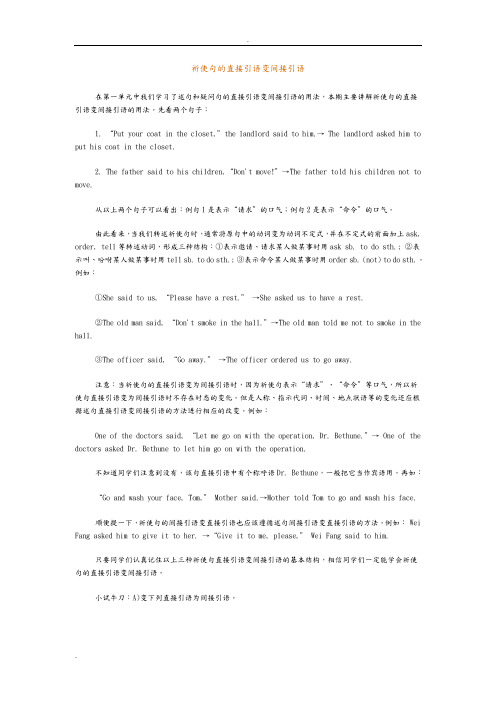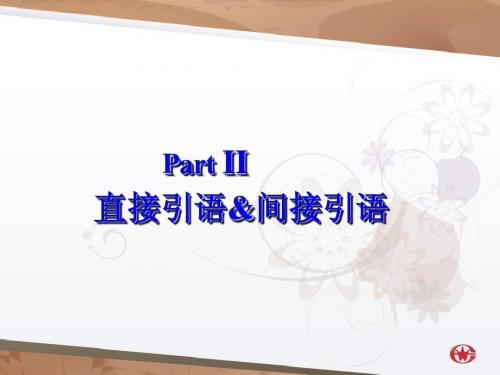高一2单元,祈使句的直接引语和间接引语
- 格式:docx
- 大小:17.09 KB
- 文档页数:3

祈使句的直接引语变间接引语在第一单元中我们学习了述句和疑问句的直接引语变间接引语的用法,本期主要讲解祈使句的直接引语变间接引语的用法。
先看两个句子:1. “Put your coat in the closet,”the landlord said to him.→ The landlord asked him to put his coat in the closet.2. The father said to his children,“Don't move!”→The father to ld his children not to move.从以上两个句子可以看出:例句1是表示“请求”的口气;例句2是表示“命令”的口气。
由此看来,当我们转述祈使句时,通常将原句中的动词变为动词不定式,并在不定式的前面加上ask, order, tell等转述动词,形成三种结构:①表示邀请、请求某人做某事时用ask sb. to do sth.; ②表示叫、吩咐某人做某事时用tell sb. to do sth.; ③表示命令某人做某事时用order sb. (not) to do sth.。
例如:①She said to us, “Please have a rest.” →She asked us to have a rest.②The old man said, “Don't smoke in the hall.”→The old man told me not to smoke in the hall.③The officer said, “Go away.” →The officer ordered us to go away.注意:当祈使句的直接引语变为间接引语时,因为祈使句表示“请求”、“命令”等口气,所以祈使句直接引语变为间接引语时不存在时态的变化。
但是人称、指示代词、时间、地点状语等的变化还应根据述句直接引语变间接引语的方法进行相应的改变。



干脆引语和间接引语的转化—祈使句一.在第一单元中我们学习了陈述句和疑问句的干脆引语变间接引语的用法,本期主要讲解祈使句的干脆引语变间接引语的用法。
先看两个句子:1.“Could you spell that word?”the teacher said to him.→ The teacher asked him to spell that word.(恳求语气)2. The father said to his children,“Don't move!”→The father told his children not to move. (吩咐语气)由此看来,当我们把干脆引语中的祈使句变为间接引语时,通常要变成ask, invite,tell,order,suggest,advise,request,warm,beg,command,encourage 等转述动词,再加上动词不定式(not)to do的形式。
其中主要的三种常用结构为:1.表示(恳求,邀请)某人做某事时用ask sb.(not) to do sth.留意:一般祈使句中有“please”,Would you....?,Can I....?She said to us, “Please have a rest.”→She asked us to have a rest.He said,“would you like to go shopping with me?”→He asked me to go shopping with him.Jim said to his deskmate,“Can I borrow your ruler?”→Jim asked his deskmate if he could borrow her\his ruler.2.表示(吩咐,叮嘱)某人做某事时用tell sb.(not) to do sth.留意:一般祈使句中有“Don't,或动词原形开头,没有please.The old man said, “Don't smoke in the hall.”→The old man told me not to smoke in the hall.Mother said to the boy,“Hurry up!”→Mother told the boy to hurry up.“Go and wash your face, Tom,” Mother said.→Mother told Tom to go and wash his face.3.表示(建议)某人做某事时用suggest/advise that+主语+should+vadvise sb to do sth留意:一般祈使句中有“Let's..../You'd better....”“Let's hold a meeting tonight.”he said to us.→He suggested that we should hold a meeting that night.“You'd better start tomorrow.”Tom said to Alice.→Tom advise Alice to start the next day.二.留意:当祈使句的干脆引语变为间接引语时:1.因为祈使句表示“恳求”、“吩咐”等口气,后面都是加(not)to do的形式,所以祈使句干脆引语变为间接引语不存在动词的时态变更。


语法专项—直接引语与间接引语一、直接引语在引用别人的原话时,被引用的句子称为直接引语(direct speech)。
引起引语的词称为引用动词(reporting verbs)。
“I remember I had seen you.”I said.“I rang the bell,”James said,“and your maid let me in.”“I know that.”replied Mrs. Green.二、间接引语当人们用自己的话报导别人的话时,被报导的部分称为间接引语(indirect speech),也可称作引语结构(report structure)。
Mary said she had already seen the film.He replied that he was going by train.这时被引用部分常常是引用动词的宾语。
除了say, reply这类词外,还有很多动词可跟这种从句。
He felt he had to do something.She guessed that he had gone to town.He thought she was worried.He explained that the train wasn’t running.在使用间接引语时要注意下面几点:1.引语前一般要用连词that。
在个别动词后(如say, tell等)或在口语中可省略。
He told his mother that the boy was very naughty.He says he can’t wait another day.2.要根据意思改变人称。
“I’ve got your letter,” she said.→She said to him, “Your pronunciation is better than mine.”→3.引语中的谓语要和句子主要谓语在时态上一致。
高中英语学习材料madeofjingetieji表示命令、请求的句子的间接引语编稿:陈玉莲审稿:牛新阁语法点拨概念引入“L ook at this example” the teacher said to us. →The teacher told us to look at the example.“Would you like to see my flat?” she asked→She asked me to see her flat语法讲解—祈使句的间接引语直接引语为祈使句时,改为间接引语,用带to的不定式表达,谓语动词常是ask, advise, tell, warn, order, request等。
如ask sb. to do (由肯定祈使句变成);ask sb. not to do (由否定祈使句变成),并且在不定式短语中的时间状语、地点状语、人称及时态都作相应的变化。
The hostess said to us,“Please sit down.”女主人跟我们说:“请坐。
”→The hostess asked us to sit down. 女主人请我们坐下。
Father said to him, “Go away!”父亲对他说:“走开!”→Father ordered him to go away. 父亲命令他走开。
Mother said to me, “Come back before 10:00.”母亲对我说:“十点前回来。
”→Mother told me to go back before 10:00. 母亲让我十点前回来。
He said, “Don’t make so much noise, boys.”他说:“孩子们,别弄出这么多噪音。
”→He told the boys not to make so much noise. 他告诉孩子们不要弄出这么大噪音。
有些含有“建议”、“劝告”的祈使句,可用suggest, insist, offer等动词转述,如:He said, “Let's have a rest.” 他说:“咱们休息一会儿吧。
表示命令、请求的句子的间接引语语法点拨概念引入“L ook at this example” the teacher said to us. →The teacher told us to look at the example.“Would you like to see my flat?” she asked→She asked me to see her flat祈使句的间接引语11. 直接引语为祈使句时,改为间接引语,多用带to的不定式表达,谓语动词常是ask, advise, tell, warn, order, request等。
如:The hostess said to us,“Pl ease sit down.”女主人跟我们说:“请坐。
”→The hostess asked us to sit down. 女主人请我们坐下。
Father said to him, “Go away!”父亲对他说:“走开!”→Father ordered him to go away. 父亲命令他走开。
(2018 四川高考) I asked Mom to stay in the sitting room and I cooked in the kitchen.我请妈妈在客厅里坐着,我在厨房做饭。
2. 注意祈使句如果是否定句,not多放在to do sth. 前。
He said, “Don’t mak e so much noise, boys.”他说:“孩子们,别弄出这么多噪音。
”→He told the boys not to make so much noise. 他告诉孩子们不要弄出这么大噪音。
3. 祈使句变成间接引语中,相应的时间状语、地点状语、人称、时态及动词等都要作相应的变化。
Mother said to me, “Com e back before 10:00.”母亲对我说:“十点前回来。
祈使句的直接引语变间接引语是重要语法点, 现作一小结。
当直接引语的句子是祈使句时, 间接引语常用动词不定式表示; 如果祈使句为否定式, 变为间接引语时, 则将原句变为动词不定式的否定式。
间接引语的动词应根据句子的意思和说话者的口气作相应的改变, 一般将原句的say酌情改为ask, beg, tell, order, demand等动词, 并在动词的后面加相应的人称作宾语。
为使间接引语的语气和意义更贴近原句, 可按下列情况酌情选用不同的谓语动词。
1. 一般情况将原句的动词say改为tell。
例如:①He said, “Hurry up!"→He told me to hurry up.他告诉我快一点。
②She said, “Don't put your bag here, Mary."→She told Mary not to put her bag there.她告诉玛丽不要把袋子放在那里。
③He said, “Never eat too much."→He told /warned us never to eat too much.他告诉我们永远不要吃得太多。
④The teacher said, “Don't be late again, Mary."→The teacher told Mary not to be late again.老师告诉玛丽不要再迟到了。
2. 有的祈使句含有please一词, 以表示婉转的语气, 将这类祈使句变为间接引语, 通常将原句的say改为ask或beg。
值得注意的是, please一词在改为间接引语时去掉。
例如:①Tom said to Alice, “Come here tomorrow, please."→Tom asked Alice to go there the next day.汤姆要求艾丽斯第二天去那里。
直接引语和间接引语的转化—祈使句
一.在第一单元中我们学习了陈述句和疑问句的直接引语变间接引语的用法,本期主要讲解祈使句的直接引语变间接引语的用法。
先看两个句子:
1.“Could you spell that word?”the teacher said to him.
→ The teacher asked him to spell that word.(请求语气)
2. The father said to his children,“Don't move!”
→The father told his children not to move. (命令语气)
由此看来,当我们把直接引语中的祈使句变为间接引语时,通常要变成ask, invite,tell,order,suggest,advise,request,warm,beg,command,encourage 等转述动词,再加上动词不定式(not)to do的形式。
其中主要的三种常用结构为:
1.表示(请求,邀请)某人做某事时用ask sb.(not) to do sth.
注意:一般祈使句中有“please”,Would you....?,Can I....?
She said to us, “Please have a rest.”
→She asked us to have a rest.
He said,“would you like to go shopping with me?”
→He asked me to go shopping with him.
Jim said to his deskmate,“Can I borrow your ruler?”
→Jim asked his deskmate if he could borrow her\his ruler.
2.表示(命令,吩咐)某人做某事时用tell sb.(not) to do sth.
注意:一般祈使句中有“Don't,或动词原形开头,没有please.
The old man said, “Don't smoke in the hall.”
→The old man told me not to smoke in the hall.
Mother said to the boy,“Hurry up!”
→Mother told the boy to hurry up.
“Go and wash your face, Tom,” Mother said.
→Mother told Tom to go and wash his face.
3.表示(建议)某人做某事时用suggest/advise that+主语+should+v
advise sb to do sth
注意:一般祈使句中有“Let's..../You'd better....”
“Let's hold a meeting tonight.”he said to us.
→He suggested that we should hold a meeting that night.
“You'd better start tomorrow.”Tom said to Alice.
→Tom advise Alice to start the next day.
二.注意:当祈使句的直接引语变为间接引语时:
1.因为祈使句表示“请求”、“命令”等口气,后面都是加(not)to do的形式,所以祈使句直接引语变为间接引语不存在动词的时态变化。
2.但是如果后面跟的如果不是(not)to do的形式,而是句子形式,就存在句子的时态变化。
3.人称、指示代词、时间、地点状语等的变化还应根据第一单元中我们学习的陈述句和疑问句的直接引语变间接引语的方法进行相应的改变。
三.习题练习
1.“Stop talking!”the monitor said to the class.
_________________________________________________________________
2.“Let's break into small groups now.”she said to us.
_________________________________________________________________
3. “Would you buy some bread for me?” he said to Linda.
_________________________________________________________________
4.The teacher said,“Stand up and don't be afraid to say what you
think.”
_________________________________________________________________
5. The patient said,“Can I sit here,Lisa?”
_________________________________________________________________
B)填空完成间接引语,每空一词。
6. “Don't forget to give the message to my wife,” he said to Li Ping.
He _______ Li Ping _______ _______ forget to give the message to
_______ wife.
7. “Mum, please help me find my shirt,” he said.
He _______ his mother _______ help _______ find _______ shirt.
8. “Use your knife to cut the leaves.” the manager said to the guard. The officer _______ the guard _______ _______ _______ knife to
cut the leaves.
9. “Will you sleep and get up early next week, MeiMei?” Father said.
Father _______ _______ _______ _______ and _______ up
early_______ _______ _______.
C)单项选择。
10. “Don't worry about me,” she _______ her sister.
A. said to
B. referred to
C. thanked to
D. spoke
11. “ _______help me with my English?”she said.
A. Shall we
B. Do you
C. Could you
D. Might you
12. She told me _______ a noise in the hall.
A. don't make
B. not to make
C. make not to
D. to make not
13. Martin _______ his dog to lie down under the big tree.
A. made
B. had
C. promised
D. ordered。